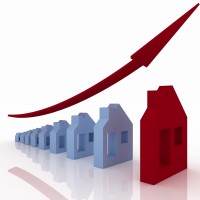
A surge in values across the country also saw the average house price in London break £500,000 for the first time, while values in the North East have now passed their pre-financial crisis peak of July 2007 – more than 13 years later.
However, the North East remains the cheapest area in the UK to buy a property with the typical price of £140,248.
According to the Office for National Statistics (ONS) house prices rose 7.6 per cent in the year to November, up from 5.9 per cent in the year to October and the fastest annual rate since June 2016.
On a month-by-month rate, prices rose by 1.4 per cent between October and November 2020, on par with the increase of 1.5 per cent the previous month.
Regionally, Yorkshire and the Humber and London saw the sharpest increases – both rising by 9.7 per cent to hit an average of £180,856 and £513,997 respectively.
These were up from 6.7 per cent in Yorkshire and The Humber and 4.6 per cent in London in the year to October 2020.
London leaps
The steep London rise is particularly surprising given already high prices in the capital, but the ONS said this was driven by a range of factors including pent-up demand, international investment and changes to property tax.
“Demand for property in Inner London may be particularly responsive to temporary property tax changes as property prices are high and therefore so is the corresponding tax to be paid,” the ONS said.
“In addition, London has a relatively high proportion of properties bought for investment, including from cash buyers and overseas investors.
“As such, demand for property in Inner London is likely influenced by a broader range of factors than the rest of the UK, including the forthcoming introduction of additional property tax for non-UK residents and geopolitical circumstances such as the new route to UK citizenship for British Nationals Overseas in Hong Kong, being introduced in January 2021,” it added.
Most startlingly, two London boroughs saw growth of more than 20 per cent – with one of them being Kensington and Chelsea, the most expensive place to buy property in the whole country.
Prices here rose from £1.17m to £1.5m on average – a leap of 28.6 per cent.
However, several London boroughs did see price falls, including the City of Westminster which fell 4.2 per cent.
National records
Looking nationally, Scotland, England and Wales all set new record highs for house prices.
Scotland saw the biggest increase in the UK with an 8.6 per cent rise over the year to November 2020, up from 6.6 per cent in the year to October, with the average house price in Scotland now £166,000.
In England prices increased by 7.6 per cent, up from 5.9 per cent in October, with the average house price at £267,000.
And in Wales the average house price is £180,000, up 7.0 per cent over the year to November 2020, from 6.3 per cent in October.
The Northern Ireland index is produced quarterly, with the next edition due in February – prices at the last edition for the period to September were £143,000 – up 2.4 per cent over the year.
Getting on the ladder
Phoebus Software sales and marketing director Richard Pike added a cautionary tone to the sharp rise in prices.
“Unfortunately, as with most things, there are those that will benefit from the current market but there are also many that will be looking at the average house price and thinking ‘how on earth do we get onto the property ladder now?’” he said.
“First-time buyers and those living in and around the capital will again, I fear, be the ones left behind.
“With the stamp duty holiday coming to an end, it is sensible to assume there will be a dip in prices at least in the short term, so it will be interesting to see how lenders’ risk appetites may be affected.”
Former Royal Institution of Chartered Surveyors (RICS) residential chairman Jeremy Leaf highlighted that the market had moved on since November.
“The reality on the ground now is that although many are rushing to meet the deadline, prospective home movers remain in limbo,” he said.
“They are sitting on their hands, partly because of lockdown restrictions but hoping for a stamp duty holiday extension as they know the present backlog would make it increasingly difficult to take advantage.
“Looking forward, I expect a much more balanced market as many of those who have agreed transactions will not make it in time but show little sign now of withdrawing or attempting to renegotiate especially while the shortage of stock continues to underpin prices.”














